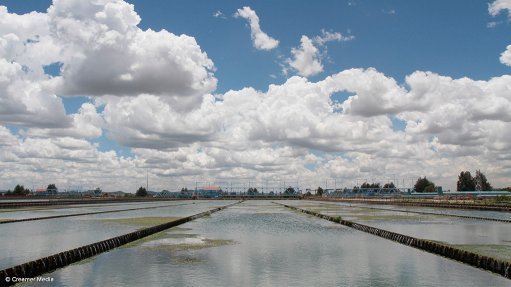
Photo by: Creamer Media
The Department of Water and Sanitation (DWS) has published the long-awaited Green Drop Certification Programme Report, awarding just 23 wastewater systems – 22 municipal systems and 1 private system – the Green Drop Certification status.
The report, in which all water services authorities, comprising 995 wastewater networks and treatment works, were subjected to the Green Drop Audit from July 1, 2020, to June 30, 2021, showed that the 23 wastewater systems scored a minimum of 90% when measured against the Green Drop standards and qualified for Green Drop Certification, compared with the 60 systems awarded Green Drop Certification status in 2013.
The water service institutions that were Green Drop certified include the City of Ekurhuleni, Lesedi local municipality, iLembe district municipality, uMgungundlovu district municipality, Witzenberg local municipality, Bitou local municipality, Drakenstein local municipality, the City of Cape Town, Saldanha Bay local municipality, Mosselbay local municipality and Sasol Sasolburg.
The audit, which covered 144 water services authorities comprising 850 systems, 12 Department of Public Works (DPW) with 115 systems and five private and State-owned organisations comprising 30 systems, identified a further 30 Green Drop Contender systems with audit scores of between 88% and 89%, but with microbiological- and chemical effluent quality not meeting the Green Drop Certification standard.
Green Drop Certification is awarded to wastewater systems that obtain scores of above 90% when compared against the criteria set for wastewater management, while a system that achieved less than 31% is regarded as a dysfunctional system which would require appropriate interventions.
A total of 334, or 39%, of municipal wastewater systems were identified to be in a critical state in 2021, compared with 248, or 29%, in 2013, which indicates that there has been regress in the state of the wastewater systems.
This decline is at both the treatment and sewer collection levels.
Limpopo has 78% of its systems in a critical state, followed by the Northern Cape with 76%, the North West with 69%, Free State with 67%, Mpumalanga with 43%, the Eastern Cape with 39%, Gauteng with 15%, KwaZulu-Natal with 14% and the Western Cape with 11%.
The results indicated that the vast majority of rural municipalities struggle to score more than 50% with only 5% of systems in Free State and Limpopo reaching this threshold, compared with 75% of the systems in Gauteng.
The Green Drop audit process established that water services institutions with low levels of investment in infrastructure and low capacity in respect of skilled personnel, were more likely to have wastewater systems in a critical state.
A total of 102 (89%) out of the 115 DPW systems were identified as in critical state, scoring below 31%, compared with 84% in 2013. Of the private systems, one plant was identified as in critical state.
Only two DPW systems received Green Drop scores of more than 50%.
Twenty-five, or 83%, of the 30 private- and State-owned systems assessed scored above 50%.
“It is of great concern that there are so many systems with scores below 31%, indicating a dismal state of wastewater management, posing a risk to both environment and public health,” said Water and Sanitation Minister Senzo Mchunu.
“I need to make it clear that action will be taken against those municipalities that flagrantly put the lives of our people and environment at risk. As Minister of Water and Sanitation, I am engaging the Minister of Cooperative Governance [and Traditional Affairs] to ensure that as National Government we take drastic intervention measures towards the improvement of water services.”
The programme aims to assist municipalities to strive for improvement in their management of wastewater as part of the incentive-based regulation approach.
“We recognised that as a flagship project, this incentive-based regulation programme has the power to mobilise the wastewater sector on a path to improvement.”
The last Green Drop and Blue Drop reports were published in 2013 and 2014 respectively.
The Blue and Green Drop Certification Programmes were reinstated following the Presidency’s commitment to fast-track the delivery of economic reforms through Operation Vulindlela, which aims to enhance service delivery in various sectors of society.
“We will use this report as the baseline for the 10-point water services improvement programme from where we will measure the sustainable turn-around which we aspire to. However, we are proud of those municipalities who have displayed their commitment towards effective wastewater management, even in the absence of the Green Drop programme over the past few years,” Mchunu commented.
The Green Drop Audits were conducted by 24 audit panels comprising two to three qualified wastewater professionals.
The audit scorecard was designed to consider evidence against five key performance areas (KPAs): capacity management; environmental management; financial management; technical management; and effluent and sludge compliance.
Each KPA and sub-criteria carry a different weighting based on the regulatory priorities.